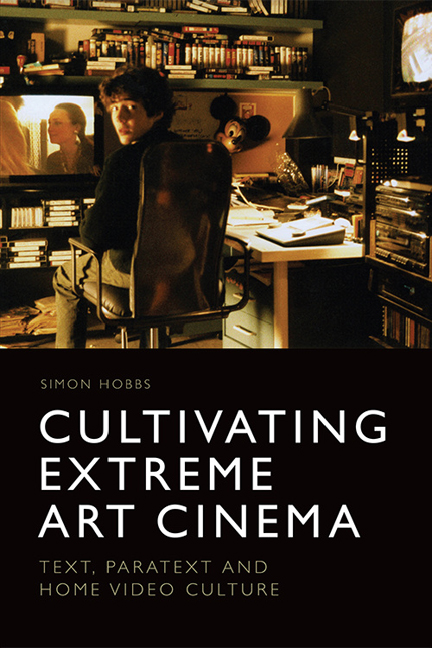Book contents
- Frontmatter
- Contents
- List of Figures
- Acknowledgements
- 1 Introduction
- 2 Art and Exploitation: Crossover, Slippage and Fluidity
- 3 Early Extremity on DVD: History, Precursors and Exploitation Auteurs
- 4 Weekend and Cannibal Holocaust: Art, Ballyhoo and Remediation
- 5 Salò, Or the 120 Days of Sodom and Ilsa, the Wicked Warden: Fascism, Pornography and Disgust
- 6 Contemporary Extremity on DVD: Trends, Hard-core and Geographic Mobility
- 7 Michael Haneke: Glaciation, Legitimacy and Transgression
- 8 Lars von Trier: Provocation, Condemnation and Confrontation
- 9 Conclusion
- Bibliography
- Index
8 - Lars von Trier: Provocation, Condemnation and Confrontation
Published online by Cambridge University Press: 28 April 2021
- Frontmatter
- Contents
- List of Figures
- Acknowledgements
- 1 Introduction
- 2 Art and Exploitation: Crossover, Slippage and Fluidity
- 3 Early Extremity on DVD: History, Precursors and Exploitation Auteurs
- 4 Weekend and Cannibal Holocaust: Art, Ballyhoo and Remediation
- 5 Salò, Or the 120 Days of Sodom and Ilsa, the Wicked Warden: Fascism, Pornography and Disgust
- 6 Contemporary Extremity on DVD: Trends, Hard-core and Geographic Mobility
- 7 Michael Haneke: Glaciation, Legitimacy and Transgression
- 8 Lars von Trier: Provocation, Condemnation and Confrontation
- 9 Conclusion
- Bibliography
- Index
Summary
Antichrist's prologue contains both hard-core sexual penetration and beautiful slow-motion cinematography. Just from these opening minutes, it is easy to see that von Trier's narrative embodies the confrontational and aggressive nature of extreme art cinema. Described as an unwatchable film (Gronstad 2011: 194), Antichrist comes towards the end of the ‘New Extremism’ boom and represents something of a shift in representations of cinematic extremity, both aesthetically and paratextually. For this chapter, three mediations of Antichrist will be investigated in order to illustrate the changing commerciality of cinematic extremity.
Lars von Trier: Art Film Provocateur
Von Trier can be regarded one of the foremost auteurs within contemporary art cinema, with Stig Bjorkman, author of Trier on Von Trier (2004), describing him as a ‘breaker of new ground’ (2009: 16). Bjorkman's statement is useful, as even a quick overview of the filmmaker's filmography highlights his innovative cinematic approach – an approach valued highly within the ‘highbrow’. Narratives such as The Idiots, The Five Obstructions (Leth and von Trier 2003), Dogville (von Trier 2003) and Nymphomaniac Vol. I and Vol. II make use of inventive filmmaking techniques which foreground the control and artistry of their director. Additionally, von Trier has won multiple awards at Cannes, claiming the Palme d’Or with Dancer in the Dark, the Grand Jury Prize with Breaking the Waves, the Jury Prize with Europa (1991) and the Technical Grand Prize with The Element of Crime (1984). These accolades, due to the pre-circulating cultural capital attached to the festival circuit, endorse von Trier's films as ‘high’ taste, marking him as a figure of value. However, von Trier's presence within this legitimised space is unstable and fraught with tension. Unlike the reliably consistent forms of authentication which surrounded Haneke, the critical discourses that enclose the work of von Trier are less uniform, and typified by debate, opposition and contradiction. This challenging relationship with the art film sector and its systems of value can be read as a symptom of the public persona von Trier projects. Often seen as a deliberately antagonistic figure who likes to bait critics and audiences alike, von Trier has been labelled by many as a provocateur. Although this moniker has been externally applied to the director by the literature surrounding his work, it can be said that he is increasingly conscious of its existence and seeks to fulfil the part bestowed unto to him.
- Type
- Chapter
- Information
- Cultivating Extreme Art CinemaText, Paratext and Home Video Culture, pp. 163 - 188Publisher: Edinburgh University PressPrint publication year: 2018



